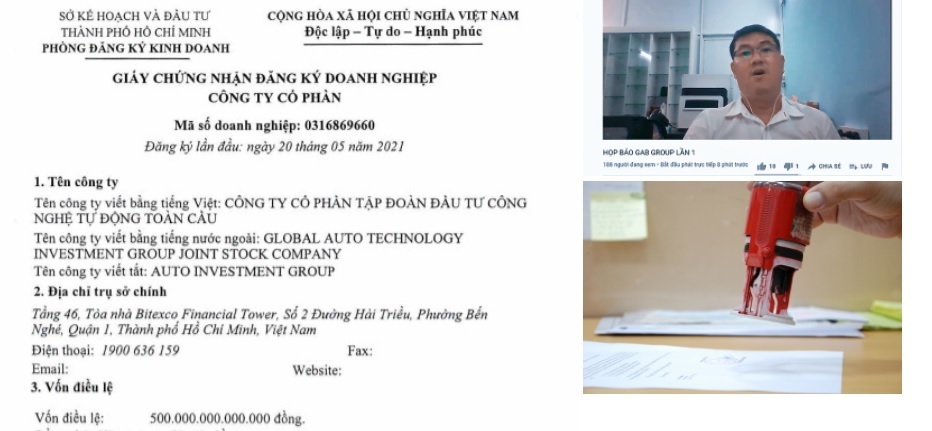
The business registration certificate
The portal showed that two businesses registered their establishment in May 2021. The special characteristic of the businesses, both of them in the information and communications sector, was that they had huge registered charter capital of a total of VND525 trillion.
The two businesses included ‘Cong ty co phan tap doan kinh doanh tu dong toan cau’ (English name ‘Global Auto Business Group JSC’) with charter capital of VND25 trillion, and ‘Cong ty CP tap doan dau tu cong nghe tu dong toan cau’ (English name ‘Auto Investment Group’) with charter capital of VND500 trillion.
Both businesses have the same legal representative, the same three founding shareholders. They operate in the field of information and communications.
The legal representative is Nguyen Vu Quoc Anh, born in 1986, residing in Thu Duc City, HCMC.
The information about the establishment of the two mega businesses stirred up the public because of the huge capital registered. Many analysts and economists expressed doubts about the financial capability of the businesses.
Questions were raised why the business registration agency granted certificates on business registration to two businesses with suspiciously high capital.
In January 2020, a business was registered with capital of VND144 trillion, or $6.5 billion.
Asked about capital contributions, Kim Thi Phuong, one of the three founding shareholders of the company, who registered to contribute VND43.2 trillion, or 30 percent of capital, said: “I don’t know. I have not contributed capital. I don’t have money, even the money for daily food."
The answer can be found in the current laws.
In the past, state management agencies needed to verify and be sure that businesses had enough capital before granting business licenses.
However, later policymakers believed that the verification was beyond the capacity of public agencies, and wasted time and money.
The 2014 Enterprise Law, with amendments to encourage people to do business, stipulated that people can make self-declarations about businesses’ charter capital when registering for business establishment.
The current laws don’t contain provisions on the compulsory minimum or maximum the capital businesses must have, except for businesses in conditional business fields. For example, real estate firms must have minimum charter capital of VND20 billion, and debt trading companies must have no less than VND100 billion.
The capital contributed to businesses can be Vietnam dong, convertible foreign currencies, gold, land-use right value, intellectual property value, technologies, technological knowhow and other properties that can be assessed in Vietnam dong.
The requirement on declaring charter capital aims to identify the contributed capital proportions and the ownership ratios of members and shareholders of the companies. This serves as a basis for defining rights, benefits and obligations of members and shareholders.
However, the absence of a requirement on minimum or maximum charter capital of a company doesn’t mean that the State won’t supervise capital contribution.
Company members and shareholders must complete their capital contribution as committed within 90 days after the day they received certificates on business registration.
If they cannot contribute enough capital, they must adjust the capital equal to the capital they contribute in reality. They will not be fined for not contributing enough capital as initially committed.
Decree 50/2016 calls for fines of VND10-20 million for not registering adjustments with the business registration agency when investors don’t have enough capital as initially committed.
This means that owners of enterprises with registered capital of VND144 trillion or VND500 trillion still can receive business registration certificates, but they will be fined if they cannot contribute the committed capital.
However, analysts point out that the fine of VND10-15 million dong for the behavior is not heavy enough to deter to those who treat laws as a joke.
Luong Bang

Fourth Covid-19 wave still raging, 80,000 businesses leave market
The Ministry of Planning and Investment's latest report found that production and business activities have been seriously affected by the Covid-19 pandemic.

More than 70,000 businesses suspend operation in H1: report
As many as 70,200 businesses halted their operation for a definite time, stopped operation while following procedures for dissolution, and completed procedures for dissolution in the first half of the year.